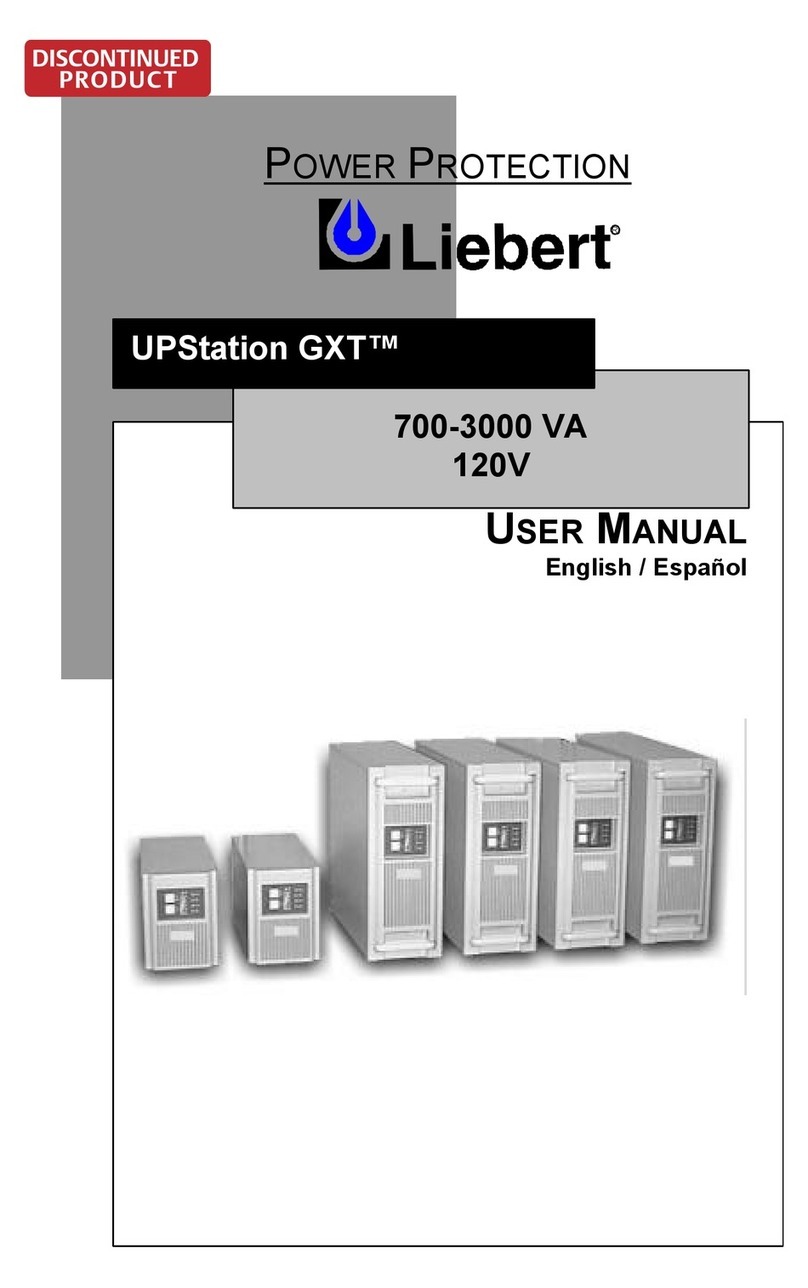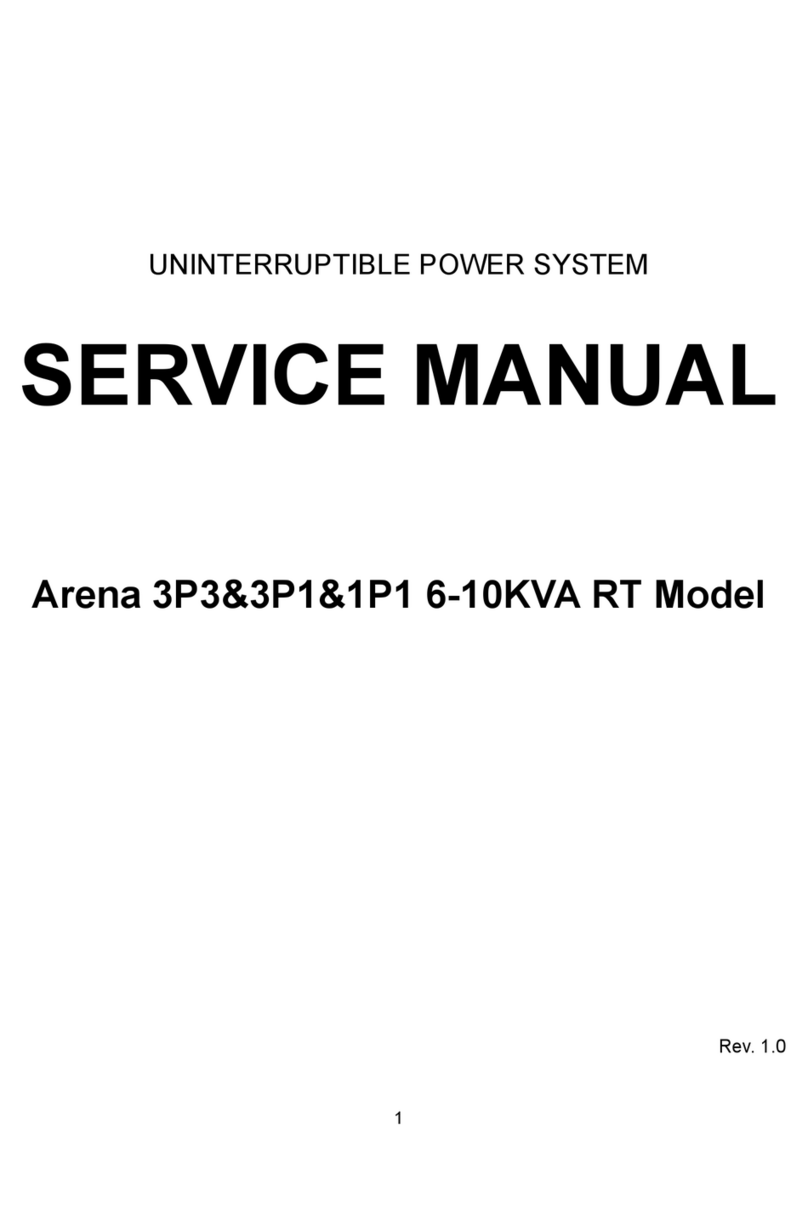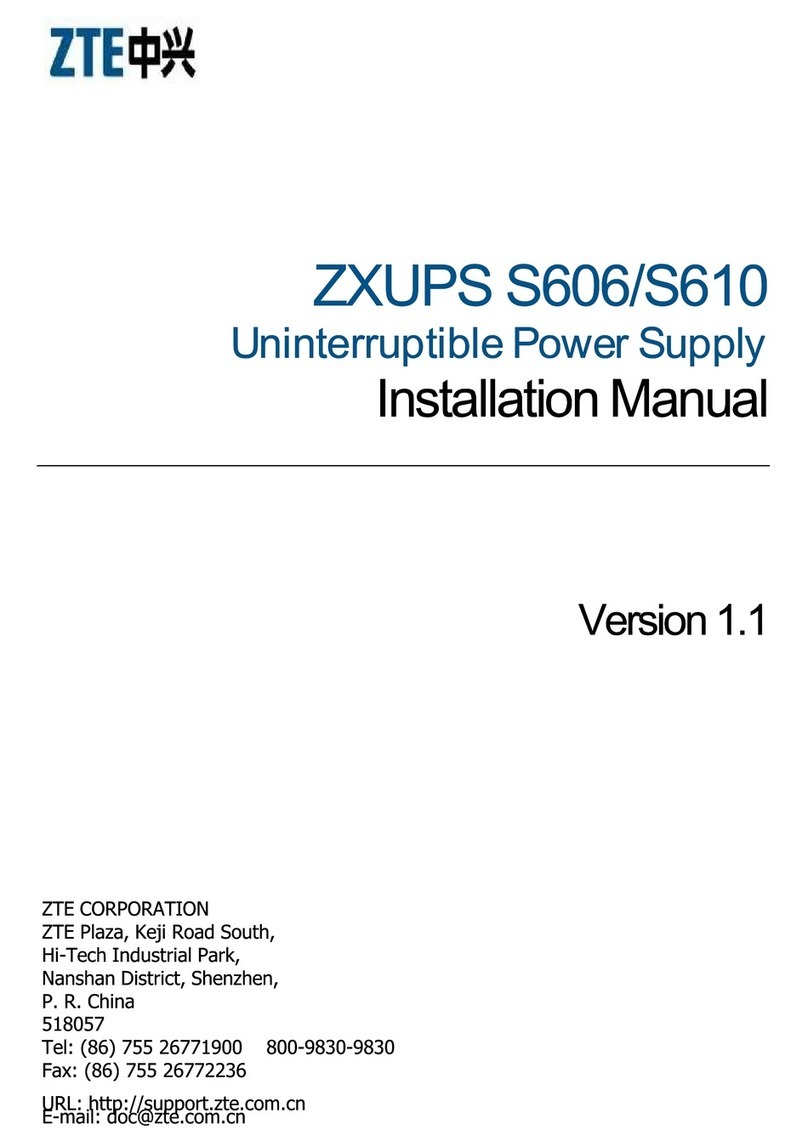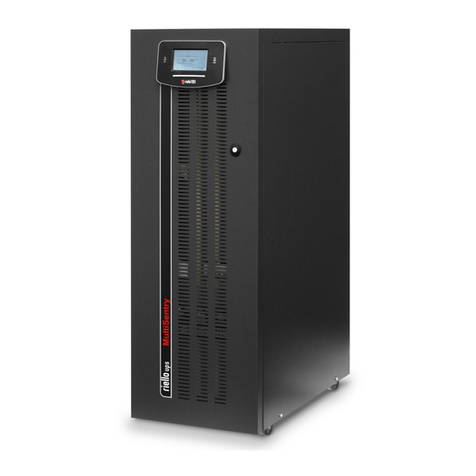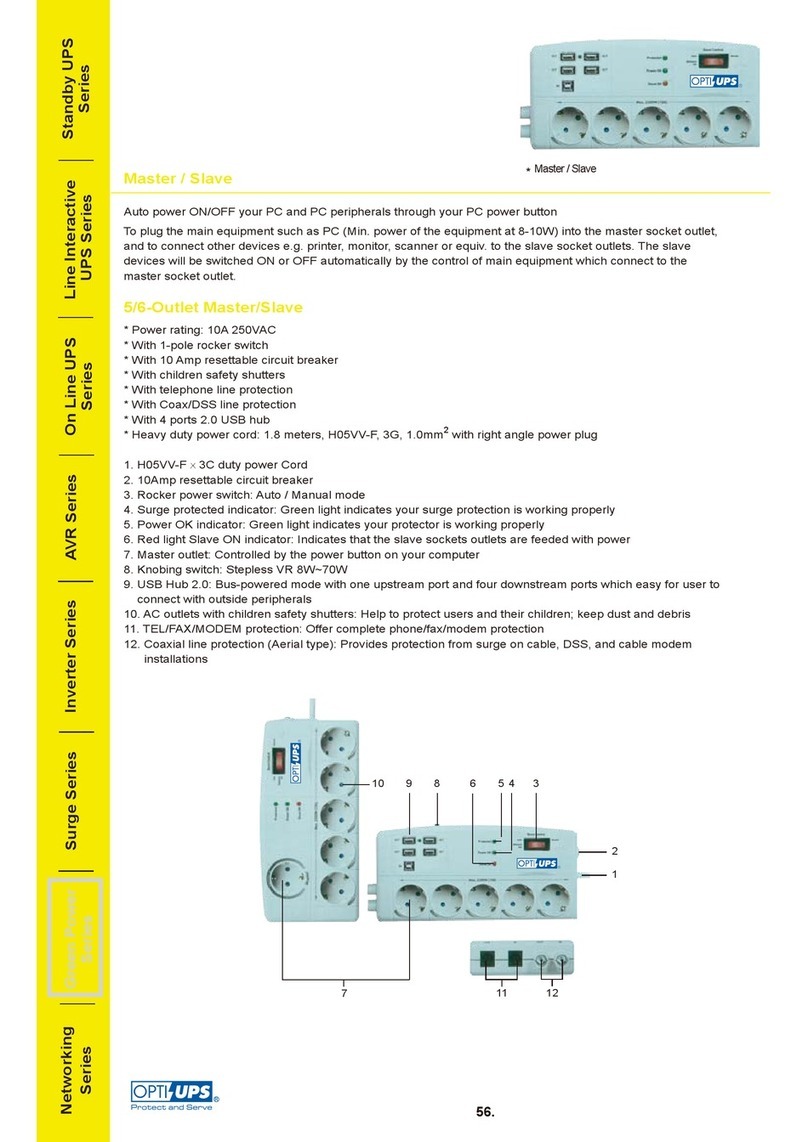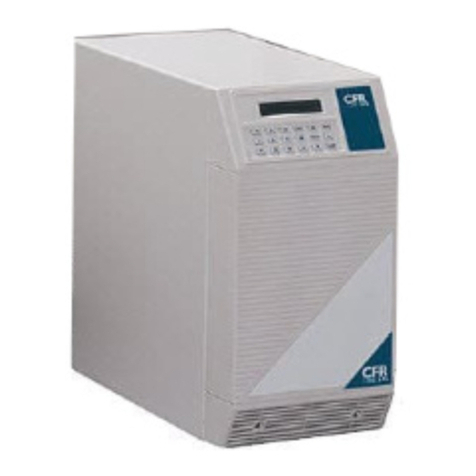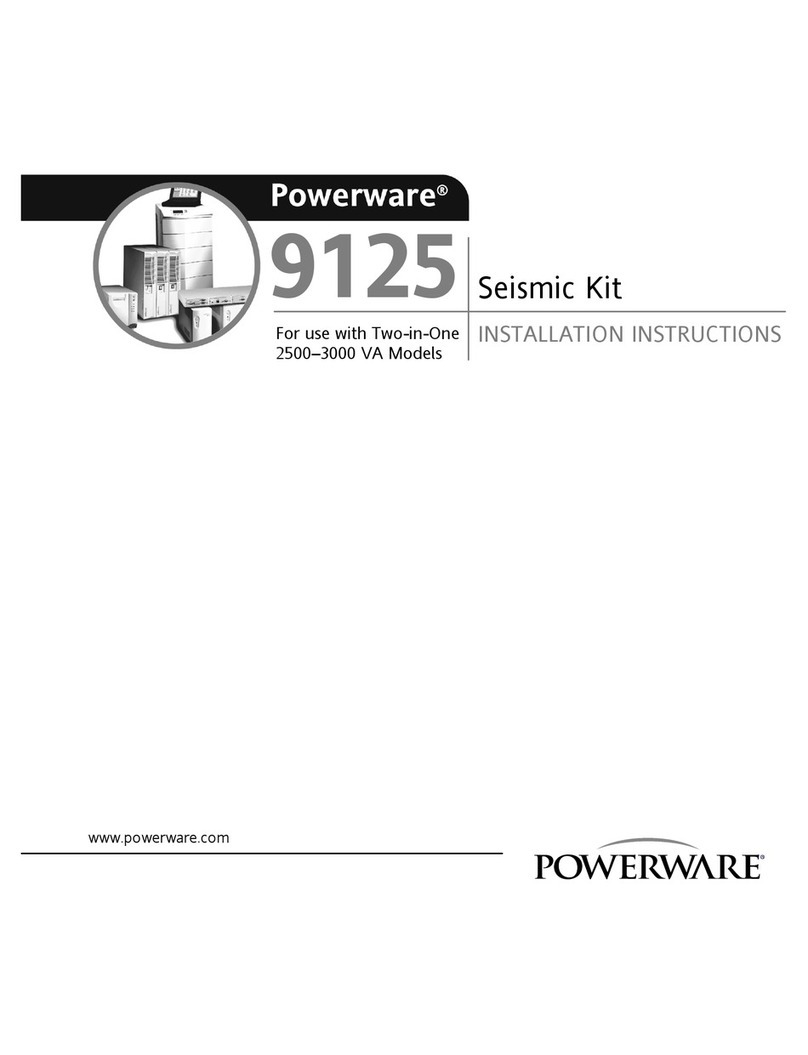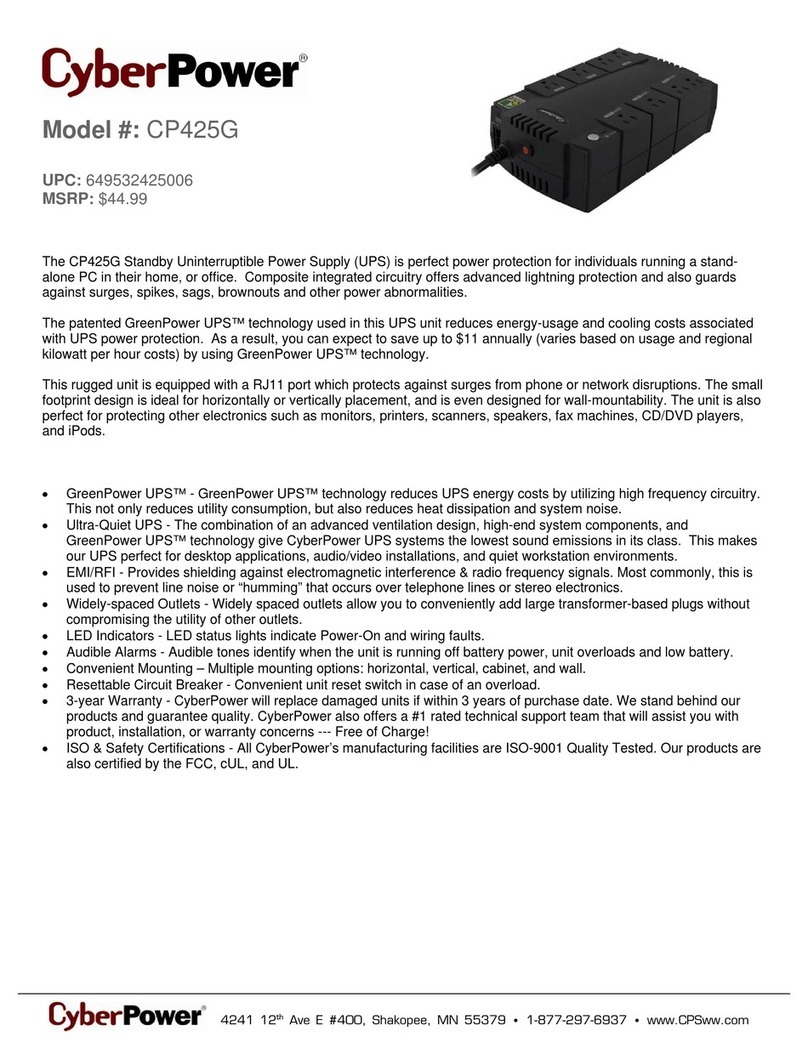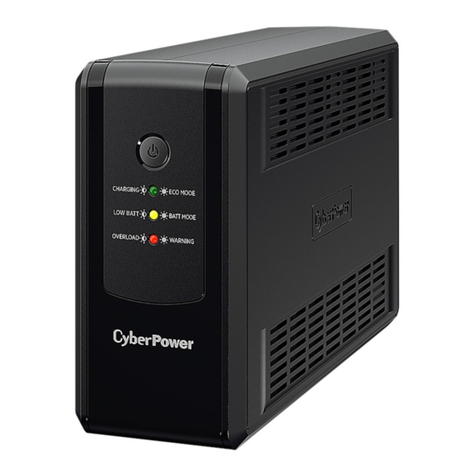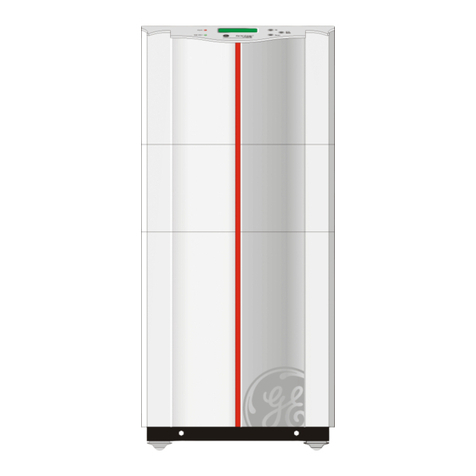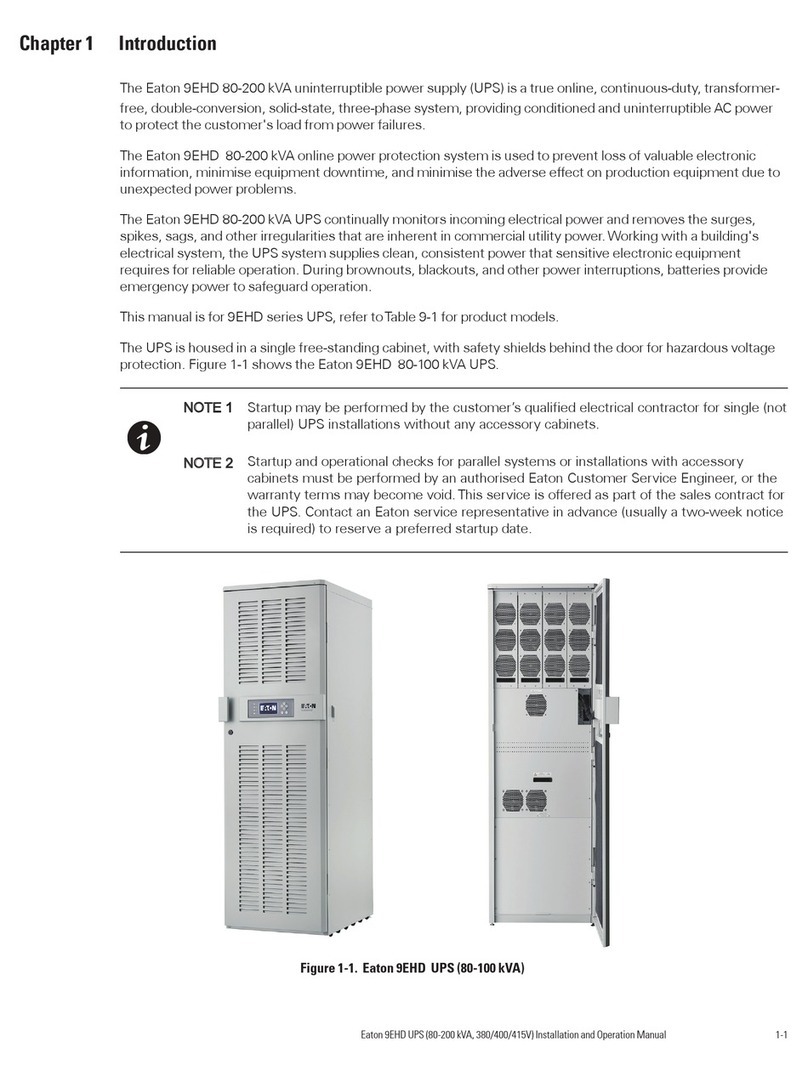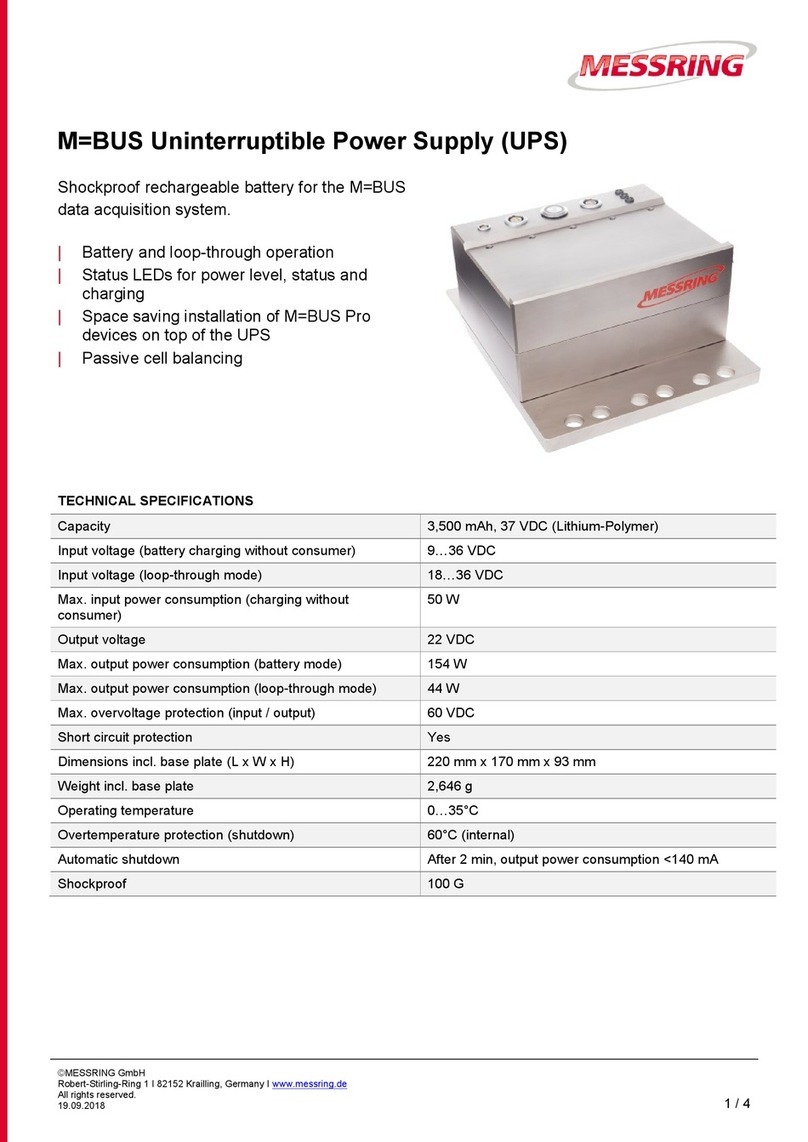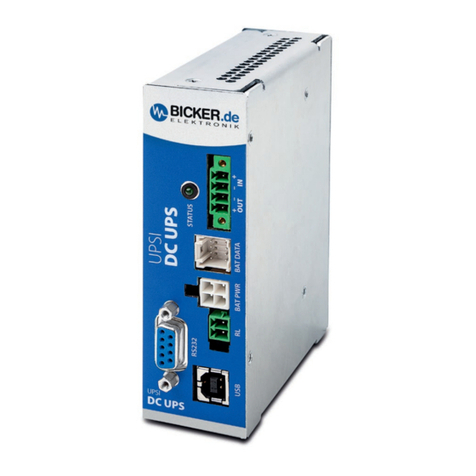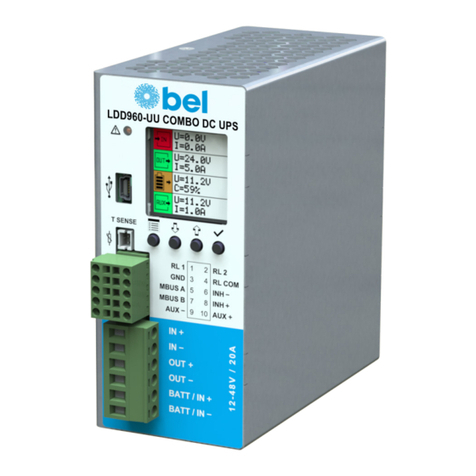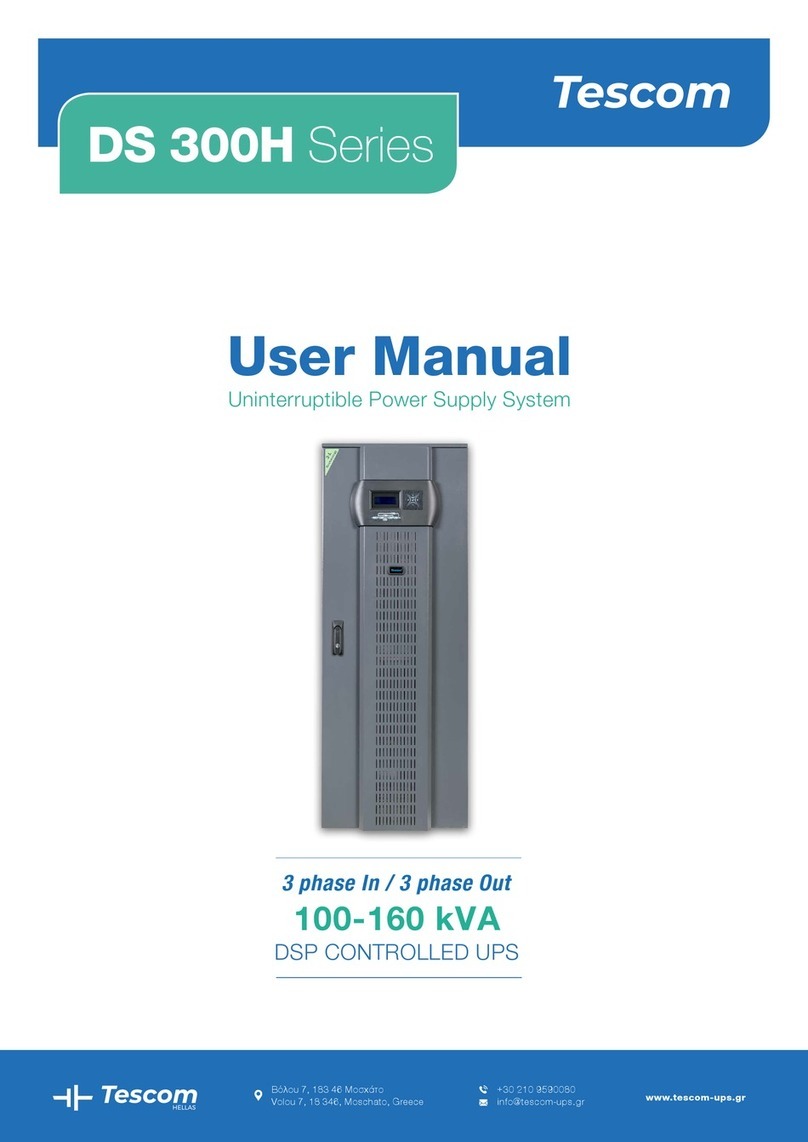Ditek DTK-UPS1000R+ User manual

DTK-UPS1000R+/DTK-UPS1500R+
DTK-UPS2000R+/DTK-UPS3000R+ Online UPS
USER MANUAL
Uninterruptible Power Supply System
Version: 1.0
INT-100209-001 Rev 1

Table of Contents
1. Important Safety Warning ................................................................................... 1
1-1. Transportation.................................................................................................... 1
1-2. Preparation ........................................................................................................ 1
1-3. Installation......................................................................................................... 1
1-4. Operation........................................................................................................... 2
1-5. Maintenance, service and faults........................................................................... 2
2. Installation and setup .......................................................................................... 5
2-1. Rear panel view.................................................................................................. 5
2-2. Operating principle ............................................................................................. 6
2-3. Install the UPS ................................................................................................... 6
2-4. Setup the UPS.................................................................................................... 7
2-5. Battery Replacement ........................................................................................ 10
2-6. Battery Kit Assembly......................................................................................... 12
3. Operations .......................................................................................................... 14
3-1. Button operation .............................................................................................. 14
3-2. LCD Panel ........................................................................................................ 14
3-3. Audible Alarm................................................................................................... 16
3-4. LCD display wordings index............................................................................... 16
3-5. UPS Setting...................................................................................................... 17
3-6. Operating Mode Description .............................................................................. 21
3-7. Faults Reference Code....................................................................................... 22
3-8. Warning indicator ............................................................................................. 22
4. Troubleshooting..................................................................................................23
5. Storage and Maintenance................................................................................... 24
6. Specifications .....................................................................................................25

1
1. Important Safety Warning
SAVE THESE INSTRUCTIONS - This manual contains important instructions that should be
followed during installation and maintenance of the UPS and batteries
Please comply with all warnings and operating instructions in this manual strictly. Do not
operate this unit before reading through all safety information and operating instructions
carefully
1-1. Transportation
Please transport the UPS system only in the original package to protect against shock
and impact.
1-2. Preparation
Condensation may occur if the UPS system is moved directly from cold to warm
environment. The UPS system must be absolutely dry before being installed. Please
allow at least two hours for the UPS system to acclimate the environment.
Do not install the UPS system near water or in moist environments.
Do not install the UPS system where it would be exposed to direct sunlight or near
heater.
Do not block ventilation holes in the UPS housing.
1-3. Installation
Do not connect appliances or devices which would overload the UPS system (e.g.
laser printers) to the UPS output sockets.
Place cables in such a way that no one can step on or trip over them.
Do not connect domestic appliances such as hair dryers to UPS output sockets.
The UPS can be operated by any individuals with no previous experience.
Connect the UPS system only to an earthed shockproof outlet which must be easily
accessible and close to the UPS system.
Please use only VDE-tested, CE-marked (or UL-marked for 100/110/115/120/125 VAC
models) mains cable (e.g. the mains cable of your computer) to connect the UPS
system to the building wiring outlet (shockproof outlet).
Please use only VDE-tested, CE-marked (or UL-marked for 100/110/115/120/125 VAC
models) power cables to connect the loads to the UPS system.
When installing the equipment, it should ensure that the sum of the leakage current
of the UPS and the connected devices does not exceed 3.5mA.
Temperature Rating - Units are considered acceptable for use in a maximum ambient
of 40°C (104°F).
For Pluggable Equipment - The socket-outlet shall be installed near the equipment
and shall be easily accessible.
CAUTION: The unit is heavy. Lifting the unit requires a minimum of two people.
Batteries with minimum case flame rating V-2 are intended for use in a computer
room as defined in the Standard for the Protection of Information Technology
Equipment, ANSI/NFAP 75. Batteries with case flame rating HB are not intended for
use in a computer room. (US installations only.)

2
1-4. Operation
Do not disconnect the mains cable on the UPS system or the building wiring outlet
(shockproof socket outlet) during operations since this would cancel the protective
earthing of the UPS system and of all connected loads.
The UPS system features its own, internal current source (batteries). The UPS output
sockets or output terminals block may be electrically live even if the UPS system is not
connected to the building wiring outlet.
In order to fully disconnect the UPS system, first press the OFF/Enter button to
disconnect the mains.
Prevent no fluids or other foreign objects from inside of the UPS system.
The EPO and USB circuits are an IEC 60950-1 safety extra low voltage (SELV) circuit.
This circuit must be separated from any hazardous voltage circuits by reinforced
insulation.
1-5. Maintenance, service and faults
The UPS system operates with hazardous voltages. Repairs may be carried out only
by qualified maintenance personnel.
Caution - risk of electric shock. Even after the unit is disconnected from the mains
(building wiring outlet), components inside the UPS system are still connected to the
battery and electrically live and dangerous.
Before carrying out any kind of service and/or maintenance, disconnect the batteries
and verify that no current is present and no hazardous voltage exists in the terminals
of high capability capacitor such as BUS-capacitors.
To avoid electrical shock, turn off the unit and unplug it form the AC power source
before servicing the battery
Only persons are adequately familiar with batteries and with the required
precautionary measures may replace batteries and supervise operations.
Unauthorized persons must be kept well away from the batteries.
Caution - risk of electric shock. The battery circuit is not isolated from the input
voltage. Hazardous voltages may occur between the battery terminals and the
ground. Before touching, please verify that no voltage is present!
Caution - Do not dispose of batteries in a fire. The batteries may explode.
Caution - Do not open or mutilate batteries. Released electrolyte is harmful to the
skin and eyes. It may be toxic.
A battery can may cause a risk of electrical shock and high short-circuit current. The
following precautions should be observed when working on batteries:
a) Remove watches, rings, or other metal objects.
b) Use tools with insulated handles.
c) Wear rubber gloves and boots.
d) Do not lay tools or metal parts on top of batteries.
e) Disconnect charging source prior to connecting or disconnecting battery terminals.
f) Determine if battery is inadvertently grounded. If inadvertently grounded, remove
source from ground. Contact with any part of a grounded battery can result in
electrical shock. The likelihood of such shock can be reduced if such grounds are
removed during installation and maintenance.

3
When changing batteries, install the same number and same type of batteries or
battery packs.
Manufacture
Type
Battery Case
Flame Rating
Rating
HITACHI CHEMICAL
ENERGY TECHNOLOGY CO
LTD (MH14533)
GP 1272
HB
12 V, 7.2 Ah
GP 1272 F2
HB
12 V, 7.2 Ah
GP 1272 FR
V-0
12 V, 7.2 Ah
GP 1272 F2FR
V-0
12 V, 7.2 Ah
UPS 12360 7
HB
12 V, 7 Ah
UPS 12360 7 FR
V-0
12 V, 7 Ah
UPS 12460
HB
12 V, 9.0 Ah
UPS 12460 FR
V-0
12 V, 9.0 Ah
HR 1234W
HB
12 V, 8.5 Ah
HR 1234W FR
V-0
12 V, 8.5 Ah
UPS 12580
HB
12 V, 9.4 Ah
UPS 12580 FR
V-0
12 V, 9.4 Ah
TAIWAN YUASA BATTERY
CO LTD (MH28947)
NPW36-12
HB
12 V, 7.0 Ah
NPW36-12FR
V-0
12 V, 7.0 Ah
UXW360-12
HB
12 V, 7.0 Ah
UXW360-12FR
V-0
12 V, 7.0 Ah
UXW460-12
HB
12 V, 8.0 Ah
UXW460-12FR
V-0
12 V, 8.0 Ah
NPW45-12
HB
12 V, 7.5 Ah
NPW45-12FR
V-0
12 V, 7.5 Ah
UXW580-12
HB
12 V, 9.0 Ah
UXW580-12 FR
V-0
12 V, 9.0 Ah
NPX-35
HB
12 V, 8.0 Ah
NPX-35 FR
V-0
12 V, 8.0 Ah
KUNG LONG BATTERIES
INDUSTRIAL CO
LTD(MH16982)
WPS580
HB
12 V, 9.0 Ah
WPS580V0
V-0
12 V, 9.0 Ah
WP7-12(28W)
HB
12 V, 7.0 Ah
WP7-12(28W)V0
V-0
12 V, 7.0 Ah
WP1234W
HB
12 V, 8.5 Ah
WP1234WV0
V-0
12 V, 8.5 Ah
WPS7-12
HB
12 V, 7.0 Ah
WPS7-12V0
V-0
12 V, 7.0 Ah
WPS8-12
HB
12 V, 8.0 Ah
WPS8-12V0
V-0
12 V, 8.0 Ah
SHIMASTU ELECTRONIC
TECHNOLOGY LTD
(MH28269)
NP7-12
V-0
12 V, 7.0 Ah
NP9.0-12
V-0
12 V, 9.0 Ah
FUJIAN MINHUA POWER
SOURCE CO LTD (MH47104)
MS7-12
V-0
12 V, 7.0 Ah
MS9-12
V-0
12 V, 9.0 Ah
SHENZHEN CENTER POWER
TECHNOLOGY CO LTD
(MH25860)
CP1270
HB
12 V, 7.0 Ah
CP1290
HB
12 V, 9.0 Ah
LEOCH BATTERY SHENZHEN
CORP (MH26866)
DJW12-7.0
HB
12 V, 7.0 Ah
DJW12-9.0
HB
12 V, 9.0 Ah
DJW12-10
HB
12 V, 10.0 Ah
SHENZHEN RITAR POWER
RT1270
HB
12 V, 7.0 Ah

4
CO LTD (MH28539)
RT1290
HB
12 V, 9.0 Ah
Please replace the fuse only with the same type and amperage in order to avoid fire
hazards.
Do not dismantle the UPS system.
NOTE: This equipment has been tested and found to comply with the limits for a
Class A digital device, pursuant to part 15 of the FCC Rules. These limits are designed
to provide reasonable protection against harmful interference when the equipment is
operated in a commercial environment. This equipment generates, uses, and can
radiate radio frequency energy and, if not installed and used in accordance with the
instruction manual, may cause harmful interference to radio communications.
Operation of this equipment in a residential area is likely to cause harmful interference
in which case the user will be required to correct the interference at his own expense.
WARNING: Changes or modifications not expressly approved by the party
responsible for compliance could void the user's authority to operate the equipment.

5
2. Installation and setup
NOTE: Before installation, please inspect the unit. Be sure that nothing inside the package is
damaged. Please keep the original package in a safe place for future use.
2-1. Rear panel view
DTK-UPS1000R+/DTK-UPS1500R+ DTK-UPS2000R+
DTK-UPS3000R+
1. Programmable outlets: connect to non-critical loads.
2. Output receptacles: connect to mission-critical loads.
3. AC input
4. Network/Fax/Modem surge protection
5. USB communication port
6. RS-232 communication port
7. SNMP intelligent slot
8. Emergency power off function connector (EPO)
9. External battery connection
10.Output circuit breaker

6
2-2. Operating principle
The operating principle of the UPS is shown as below
EMI/RFI
Filters
Battery
Charger Battery
DC-to-DC
Converter
Inverter
Rectifier
/PFC
Input Output
The UPS is composed of mains input,
EMI/RFI filters, rectifier/PFC,
inverter, battery charger, DC-to-DC
converter, battery, dynamic bypass and
UPS output.
Dynamic
Bypass
The UPS is composed of mains input, EMI/RFI filters, rectifier/PFC, inverter, battery charger,
DC-to-DC converter, battery, dynamic bypass and UPS output.
2-3. Install the UPS
This UPS can be either displayed on the desk or mounted in the 19” rack chassis. Please choose
proper installation to position this UPS.
Rack-mount Installation
Step 1 Step 2
UPS Tower Installation
Step 1
Step 2
Step 3

7
Tower Installation with battery pack
Step 1
Step 2
2-4. Setup the UPS
Before installing the UPS, please read below to select proper location to install UPS.
1. UPS should be placed on the flat and clean surface. Place it in an area away from vibration,
dust, humidity, high temperature, flammable liquids, gases, corrosive and conductive
contaminants. Install the UPS indoors in a clean environment, where it is away from
window and door. Maintain minimum clearance of 100mm in the bottom of the UPS to
avoid dust and high temperature.
2. It’s required to maintain maximum altitude of 3000m to keep UPS normal operation at full
load UPS.
3. Place UPS:
It’s equipped with fan for cooling. Therefore, place the UPS in a well-ventilated area. It’s
required to maintain minimum clearance of 100mm in the front of the UPS and 300mm in the
back and two sides of the UPS for heat dissipation and easy-maintenance.
Step 1: External battery connection
For safety consideration, the RT UPS is shipped out from factory without connecting battery
wires. Before connecting to external batteries, it’s required to have the internal battery wire
disconnected. Follow the below steps to make external battery connection.
1. Turn off UPS and remove power plug from the mains.
2. Remove front panel and disconnect internal battery wire. (only available for RT models with
internal battery wire connected)

8
3. Remove the cover of the external battery connector by using a
screwdriver.
4. Plug the battery cable into the external battery connector of the UPS
and the battery pack(s).
Note: If you have multiple battery packs available, connect them serially. An example is
shown in the diagram below (connecting the second battery connector of the first
battery pack to the first battery connector of the second battery pack).
5. Stabilize the connector to the UPS and the battery pack(s) by fixing screws as shown below
diagram.
6. Connect internal battery connector and put the front panel back to the unit.
UPS
Battery
pack #1
Battery
pack #2

9
Step 2: UPS input connection
Plug the UPS into a two-pole, three-wire, grounded receptacle only. Avoid using extension
cords. The power cord is attached to the UPS. The input plug is a NEMA 5-15P for
DTK-UPS1000R+/ DTK-UPS1500R+models, NEMA 5-20P for DTK-UPS2000R+ model and
NEMA L5-30P for DTK-UPS3000R+ model.
To reduce the risk of fire, connect only to a circuit provided with (@) a maximum branch circuit
overcurrent protection in accordance with the National Electrical Code, ANSI/NFPA 70 and the
Canadian Electrical Code, Part I, C22.1.
Model
(@)
DTK-UPS1000R+
20A
DTK-UPS1500R+
20A
DTK-UPS2000R+
20A
DTK-UPS3000R+
40A
Note: Check if the site wiring fault indicator lights up in LCD panel. It will be illuminated when
the UPS is plugged into an improperly wired utility power outlet (Refer to Troubleshooting
section).
Step 3: UPS output connection
There are two kinds of outputs: programmable outlets and general outlets. Please connect
non-critical devices to the programmable outlets and critical devices to the general outlets.
During power failure, you may extend the backup time to critical devices by setting shorter
backup time for non-critical devices.
Step 4: Communication connection
Communication port:
USB port RS-232 port Intelligent slot
To allow for unattended UPS shutdown/start-up and status monitoring, connect the
communication cable one end to the USB/RS-232 port and the other to the communication
port of your PC. With the monitoring software installed, you can schedule UPS
shutdown/start-up and monitor UPS status through PC.
The UPS is equipped with intelligent slot perfect for either SNMP or AS400 card. When
installing either SNMP or AS400 card in the UPS, it will provide advanced communication and
monitoring options.
Step 5: Network connection
Network/Fax/Phone surge port
Connect a single modem/phone/fax line into surge-protected “IN” outlet on the back panel of
the UPS unit. Connect from “OUT” outlet to the equipment with another modem/fax/phone line
cable.

10
Step 6: Disable and enable EPO function
This UPS is equipped with EPO function. By default, the UPS is delivered from factory with Pin
1 and pin 2 closed (a metal plate is connected to Pin 1 and Pin2) for UPS normal operation. To
activate EPO function, remove two screws on EPO port and metal plate will be removed.
Note: The EPO function logic can be set up via LCD setting. Please refer to program 16 in UPS
setting for the details.
Step 7: Turn on the UPS
Press the ON/Mute button on the front panel for two seconds to power on the UPS.
Note: The battery charges fully during the first five hours of normal operation. Do not
expect full battery run capability during this initial charge period.
Step 8: Install software
For optimal computer system protection, install UPS monitoring software to fully configure UPS
shutdown. Use supplied RS-232 or USB communication cable to connect RS-232/USB port of
UPS and RS-232/USB port of PC. Then, follow below steps to install monitoring software.
1. Insert the included installation CD into CD-ROM drive and then follow the on-screen
instructions to proceed software installation. If there no screen shows 1 minute after
inserting the CD, please execute setup.exe file for initiating software installation.
2. Follow the on-screen instructions to install the software.
3. When your computer restarts, the monitoring software will appear as an orange plug icon
located in the system tray, near the clock.
2-5. Battery Replacement
When the icons of and are flashing in LCD display and alarm is sounding every 2
seconds, it’s time to replace batteries. Contact your service representative to replace batteries.
Do not disconnect battery connectors under load If you prefer to remove input power to
change the batteries, press the OFF button on the front panel for two seconds to power off the
UPS and switch off utility power where the UPS is connected.
NOTE 1 : DO NOT DISCONNECT the batteries while the UPS is in Battery mode.
NOTE 2 : A small amount of arcing may occur when connecting the internal batteries. This is
normal condition and no harm for personnel. Connect the cables quickly and firmly.
NOTE 3 : This UPS is equipped with internal batteries and only service person can replace the
batteries.
NOTE 4 : Upon battery disconnection, equipment is not protected from power outages.
It’s in closed status for UPS
normal operation as default.
To activate EPO
function, remove
these two screws.

11
CAUTION!! Consider all warnings, cautions, and notes before replacing batteries.
Step 1
Step 2
Step 3
Remove front panel.
Disconnect battery wires.
Pull out the battery box by
removing two screws on the
front panel.
Step 4
Step 5
Step 6
Remove the top cover of
battery box and replace the
inside batteries.
After replacing the
batteries, put the battery
box back to original location
and screw it tightly.
Re-connect the battery wires.
Step 7
Put the front panel back to the unit.

12
2-6. Battery Kit Assembly
NOTICE: Please assemble battery kit first before installing it inside of UPS. Please select
correct battery kit procedure below to assemble it.
2-battery kit
Step 1: Remove adhesive tapes.
Step 2: Connect all battery terminals by
following below chart.
Step 3: Put assembled battery packs on
one side of plastic shells.
Step 4: Cover the other side of plastic shell as
below chart. Then, battery kit is assembly well.
3-battery kit
Step 1: Remove adhesive tapes.
Step 2: Connect all battery terminals by
following below chart.
Step 3: Put assembled battery packs on
one side of plastic shells as below chart.
Step 4: Cover the other side of plastic shell as
below chart. Then, battery kit is assembly well.
Tapes
Tapes
Tapes

13
4-battery kit
Step 1: Remove adhesive tapes.
Step 2: Connect all battery terminals by
following below chart.
Step 3: Put assembled battery packs on
one side of plastic shells.
Step 4: Cover the other side of plastic shell as
below chart. Then, battery kit is assembly well.
6-battery kit
Step 1: Remove adhesive tapes.
Step 2: Connect all battery terminals by
following below chart.
Step 3: Put assembled battery packs on
one side of plastic shells.
Step 4: Cover the other side of plastic shell as
below chart. Then, battery kit is assembly well.
Tapes
Tapes
Tapes
Tapes

14
3. Operations
3-1. Button operation
Button
Function
ON/Mute
Button
Turn on the UPS: Press and hold ON/Mute button for at least 2 seconds to
turn on the UPS.
Mute the alarm: After the UPS is turned on in battery mode, press and
hold this button for at least 3 seconds to disable or enable the alarm
system. But it’s not applied to the situations when warnings or errors
occur.
Up key: Press this button to display previous selection in UPS setting
mode.
Switch to UPS self-test mode: Press ON/Mute buttons for 3 seconds to
enter UPS self-testing while in AC mode, ECO mode, or converter mode.
OFF/Enter
Button
Turn off the UPS: Press and hold this button at least 2 seconds to turn off
the UPS. UPS will be in standby mode under power normal or transfer to
Bypass mode if the Bypass enable setting by pressing this button.
Confirm selection key: Press this button to confirm selection in UPS
setting mode.
Select
Button
Switch LCD message: Press this button to change the LCD message for
input voltage, input frequency, input current, battery voltage, battery
current, battery capacity, ambient temperature, output voltage, output
frequency, load current and load percent.
Setting mode: Press and hold this button for 3 seconds to enter UPS
setting mode when Standby and Bypass mode.
Down key: Press this button to display next selection in UPS setting
mode.
ON/Mute
+ Select
Button
Switch to bypass mode: When the main power is normal, press ON/Mute
and Select buttons simultaneously for 3 seconds. Then UPS will enter to
bypass mode. This action will be ineffective when the input voltage is out
of acceptable range.
Exit setting mode or return to the upper menu: When working in setting
mode, press ON/Mute and Select buttons simultaneously for 0.2 seconds
to return to the upper menu. If it’s already in top menu, press these two
buttons at the same time to exit the setting mode.
3-2. LCD Panel

15
Display
Function
Backup time information
Indicates the estimated backup time.
H: hours, M: minute, S: second.
Configuration and fault information
Indicates the configuration items, and the configuration items are listed in
details in section 3-5.
Indicates the warning and fault codes, and the codes are listed in details in
section 3-7 and 3-8.
Mute operation
Indicates that the UPS alarm is disabled.
Input, Battery, Temperature, Output & Load information
IIndicate the input voltage, input frequency, input current, battery voltage,
battery current, battery capacity, ambient temperature, output voltage,
output frequency, load current and load percent.
k: kilo, W: watt, V: voltage, A: ampere, %: percent, ℃: centigrade degree, Hz: frequency
Load information
Indicates the load level by 0-24%, 25-49%, 50-74% and 75-100%.
Indicates overload.
Programmable outlets information
Indicates that programmable management outlets are working.
Mode operation information
Indicates the UPS connects to the mains.
Indicates the battery is working.
Indicates charging status
Indicates the bypass circuit is working.
Indicates the ECO mode is enabled.
Indicates the AC to DC circuit is working.
Indicates the PFC circuit is working.
Indicates the inverter circuit is working.
Indicates the UPS is working in converter mode.
Indicates the output is working.
Battery information
Indicates the battery level by 0-24%, 25-49%, 50-74%, and 75-100%.
Indicates low battery.

16
3-3. Audible Alarm
Battery Mode
Sounding every 5 seconds
Low Battery
Sounding every 2 seconds
Overload
Sounding every second
Fault
Continuously sounding
Bypass Mode
Sounding every 10 seconds
3-4. LCD display wordings index
Abbreviation
Display content
Meaning
ENA
Enable
DIS
Disable
ESC
Escape
HLS
High loss
LLS
Low loss
AO
Active open
AC
Active close
EAT
Estimated autonomy time
RAT
Running autonomy time
SD
Shutdown
OK
OK
ON
ON
BL
Battery Low
OL
Over Load
OI
Over input current
NC
Battery No Connect
OC
Over Charge
SF
Site wiring fault
EP
EPO
TP
Temperature
CH
Charger
BF
Battery Fault
BV
Bypass Out Range
FU
Bypass frequency unstable
BR
Battery Replace
EE
EEPROM error

17
3-5. UPS Setting
Parameter 1 Parameter 2
There are three parameters to set up the UPS.
Parameter 1: It’s for program alternatives.
Refer to below table.
Parameter 2 is the setting options or values
for each program.
01: Output voltage setting
Interface
Setting
Parameter 2: Output voltage
For 100/110/115/120/125/127Vac models, you may choose
the following output voltage:
100: presents output voltage is 100Vac
110: presents output voltage is 110Vac
115: presents output voltage is 115Vac
120: presents output voltage is 120Vac (Default)
125: presents output voltage is 125Vac
127: presents output voltage is 127Vac
(127Vac is not applicable in USA region)
02: Frequency Converter enable/disable
Interface
Setting
Parameter 2: Enable or disable converter mode. You may
choose the following two options:
CF ENA: converter mode enable
CF DIS: converter mode disable (Default)
03: Output frequency setting
Interface
Setting
Parameter 2: Output frequency setting.
You may set the initial frequency on battery mode:
BAT 50: presents output frequency is 50Hz
BAT 60: presents output frequency is 60Hz
If converter mode is enabled, you may choose the following
output frequency:
CF 50: presents output frequency is 50Hz
CF 60: presents output frequency is 60Hz
04: ECO enable/disable
Interface
Setting
Parameter 2: Enable or disable ECO function. You may
choose the following two options:
ENA: ECO mode enable
DIS: ECO mode disable (Default)

18
05: ECO voltage range setting
Interface
Setting
Parameter 2: Set the acceptable high voltage point and
low voltage point for ECO mode by pressing Down key or Up
key.
HLS: High loss voltage in ECO mode in parameter 2.
The setting range in parameter 3 is from +3V to +12V of the
nominal voltage. (Default: +6V)
LLS: Low loss voltage in ECO mode in parameter 2.
The setting voltage in parameter 3 is from -3V to -12V of the
nominal voltage. (Default: -6V)
06: Bypass enable/disable when UPS is off
Interface
Setting
Parameter 2: Enable or disable Bypass function. You may
choose the following two options:
ENA: Bypass enable
DIS: Bypass disable (Default)
07: Bypass voltage range setting
Interface
Setting
Parameter 2: Set the acceptable high voltage point and
acceptable low voltage point for Bypass mode by pressing
the Down key or Up key.
HLS: Bypass high voltage point
120-140: setting the high voltage point from 120Vac to
140Vac. (Default: 132Vac)
LLS: Bypass low voltage point
85-115: setting the low voltage point from 85Vac to
115Vac. (Default: 85Vac)
08: Bypass frequency range setting
Interface
Setting
Parameter 2: Set the acceptable high frequency point and
acceptable low frequency point for Bypass mode by pressing
the Down key or Up key.
HLS: Bypass high frequency point
For 50Hz output frequency models:
51-55Hz: setting the frequency high loss point from 51Hz
to 55HZ. (Default: 53.0Hz)
For 60Hz output frequency models:
61-65Hz: setting the frequency high loss point from 61Hz
to 65Hz. (Default: 63.0Hz)
LLS: Bypass low Frequency point
For 50Hz output frequency models:
45-49Hz: setting the frequency low loss point from 45Hz to
This manual suits for next models
3
Table of contents
Other Ditek UPS manuals

